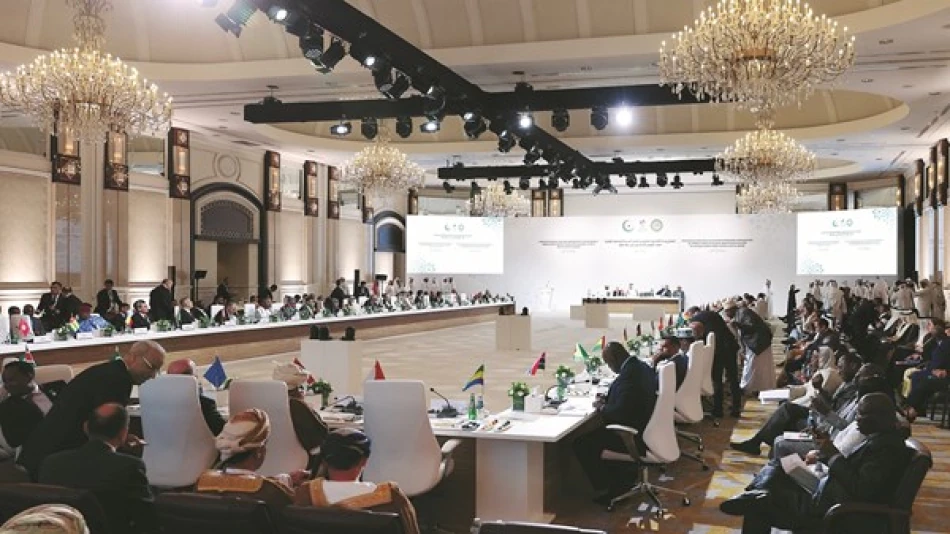
Qatar Hosts Crucial Arab-Islamic Summit to Address Israeli Aggression
Arab-Islamic Summit Convenes in Doha Following Israeli Attack on Qatar Territory
Qatar is hosting an emergency Arab-Islamic summit following last week's Israeli strike on Hamas leadership within Doha, marking a significant escalation that has unified Arab and Islamic nations in condemning what they characterize as state terrorism. The attack, which occurred in broad daylight in a residential area of the Qatari capital, has prompted calls for international accountability and threatens to derail ongoing Gaza ceasefire negotiations.
Unprecedented Attack on Mediator Nation
The Israeli operation targeted Hamas leaders in a residential neighborhood of Doha, resulting in the death of a Qatari security officer and civilian casualties. What makes this strike particularly significant is its timing and location—Qatar has been serving as a key mediator in Gaza ceasefire talks alongside Egypt and the United States, with Israeli knowledge and participation in these diplomatic efforts.
Qatari Prime Minister and Foreign Minister Sheikh Mohammed bin Abdulrahman described the attack as occurring "in broad daylight in a residential area containing homes, schools, kindergartens, and diplomatic missions." He characterized it as not merely targeting a location, but as "an assault on the principle of mediation itself, and on everything that diplomacy represents as an alternative to war and destruction."
Diplomatic Implications
The strike represents a dangerous precedent in Middle Eastern diplomacy. By targeting individuals on the territory of a mediating nation, Israel has effectively challenged the traditional immunity afforded to neutral parties in conflict resolution. This action could fundamentally alter how regional mediation is conducted, potentially forcing future negotiations onto more distant, neutral ground.
Regional Response and Unity
Foreign ministers from Arab and Islamic nations gathered ahead of the summit, declaring Qatar's security "an integral part of Arab and Islamic national security." The unified response demonstrates how the attack has transcended typical regional divisions, creating rare consensus among diverse nations.
Arab League Secretary-General Ahmed Aboul Gheit condemned the attack as combining "cowardice, treachery, and folly," while Organization of Islamic Cooperation Secretary-General Hussein Ibrahim Taha called for "decisive measures to hold Israel accountable for violating Qatar's sovereignty."
International Law Violations
The attack raises serious questions about international law, particularly regarding the sovereignty of UN member states and the protection of diplomatic processes. Qatar's role as a mediator should theoretically provide additional protection under international norms, making the Israeli action a potential violation of multiple legal frameworks.
Impact on Gaza Negotiations
Despite the attack, Qatar has vowed to continue its mediation efforts with Egypt and the United States to secure a Gaza ceasefire. However, the strike has fundamentally altered the negotiating environment, potentially making Qatar more cautious about hosting sensitive diplomatic processes.
The timing suggests either a calculated attempt to derail negotiations or a prioritization of tactical objectives over diplomatic processes. Either interpretation carries significant implications for future peace efforts in the region.
Broader Strategic Calculations
Israel's willingness to risk its relationship with Qatar—a nation that has facilitated previous prisoner exchanges and maintains channels with Hamas—indicates a shift in strategic priorities. This could signal either confidence in military solutions or frustration with the pace of diplomatic progress.
Regional Stability Concerns
The attack occurs amid already heightened tensions across the Middle East, with ongoing conflicts in Gaza and increasing regional polarization. By expanding operations to Qatar's territory, Israel has effectively widened the geographic scope of the conflict, potentially drawing in nations that had remained relatively neutral.
The unified Arab-Islamic response, while largely symbolic, demonstrates how the attack has provided these nations with a clear case of sovereignty violation around which to rally. This could strengthen regional cooperation mechanisms and potentially lead to more coordinated responses to future incidents.
Long-term Implications
The incident may fundamentally reshape Middle Eastern diplomacy, potentially ending Qatar's unique role as a bridge between Western allies and regional resistance movements. Future mediation efforts may require different venues and mechanisms, complicating an already complex regional landscape.
The attack also tests international commitment to protecting mediating nations, with the global response likely to influence whether such strikes become more common or remain isolated incidents.
Most Viewed News

 Layla Al Mansoori
Layla Al Mansoori






